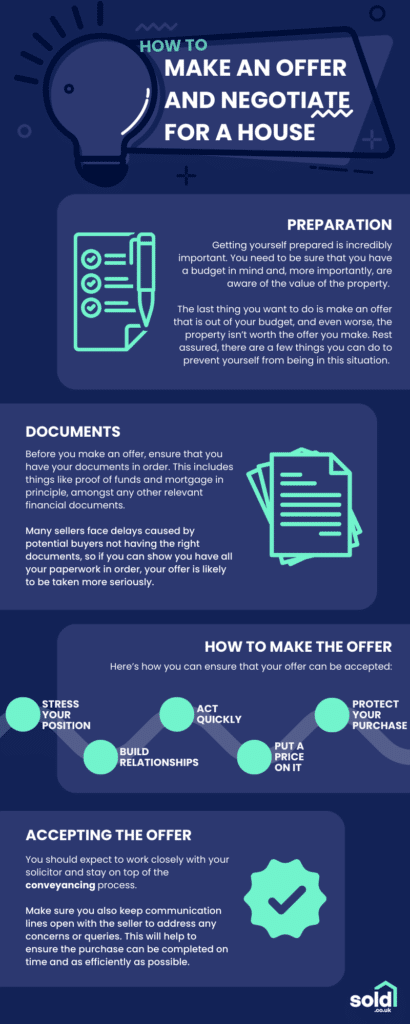Negotiating on house price can be quite a stressful experience.
You don’t want to offend the seller, but you also want to get the best deal possible.
In this position, it’s natural to wonder: what is a reasonable offer on a house?

Should you offer the asking price straight away on a house?
It depends on the situation, but most estate agents don’t recommend this.
Your first offer doesn’t need to be your final offer.
It simply gets the ball rolling for negotiation. Most sellers expect the first offers to be below asking price.
The circumstances might encourage you to offer the asking price immediately.
Perhaps it’s a seller’s market, so you’ve got lots of competition. Or maybe you think the house is undervalued.
Your seller could’ve also listed their property as inviting ‘offers over’.
In this case, anything below the starting price can be met with a lack of enthusiasm.
Sometimes, even offering their asking price straight away doesn’t work in your favour.
You may convince the seller that they’ve undervalued their house, causing them to push the price higher!
Context is important. Ask your estate agent about the seller’s mindset.
Is 10% below asking price reasonable?
Yes, anywhere within 10% of the asking price is usually considered reasonable.
Your seller might’ve even factored this into their marketing.
Many homeowners list their property slightly higher. They do this expecting an offer slightly below that number.
Should the market conditions impact the offer you make?
Yes, you should pay attention to the local market when making an offer.
To start with, research what else is available at the same price point. This guides you on whether a house is fairly valued, or overinflated.
You should also assess whether it’s a buyer’s or seller’s market.
A property expert can guide you on this. This detail influences how much negotiating power you have.
Will a low offer offend the seller?
It depends on the situation. You should speak to your estate agent to understand the seller’s mindset.
You should explain your offer, when you submit it.
The estate agent can then relay this to the seller. If you’re clear and fair, then the seller will likely be more understanding.
For instance, there might be a problem with the house that they haven’t noticed.
You should also check the seller’s listing. If they’ve advertised the property with ‘offers over’ then bidding below this could cause offence.
A low offer likely won’t offend the seller if the property needs lots of work. Even if their price takes this into account, they probably anticipated it.
Ensure you’re always respectful and clear. Research the market and don’t make personal comments.
Factors that influence what you can afford
Budget
You must calculate your budget before you enter the market.
Combining your deposit and mortgage gives an upper ceiling that you can’t go above.
Ideally, you’ll view properties where there’s a bit of breathing room on price.
This means that if a bidding war begins, you aren’t forced to immediately walk away.
Mortgage
Your mortgage in principle enables you to calculate your budget.
But don’t forget that these documents can sometimes have conditions attached! And things can change down the line.
For example, your lender might disagree with the valuation of the house. Or it could refuse to lend because the house is uninhabitable.
Get a valuation sorted as soon as possible, to confirm these details. It could impact your spending power.
Council tax and service charge
Often, the property price isn’t your only major expense.
You’ll also take on the council tax and service charge (if leasehold) for the house. These are unique to each location and property.
For example, even if the house is affordable, the service charge might not be.
You’ll need to factor this into your offer.
















